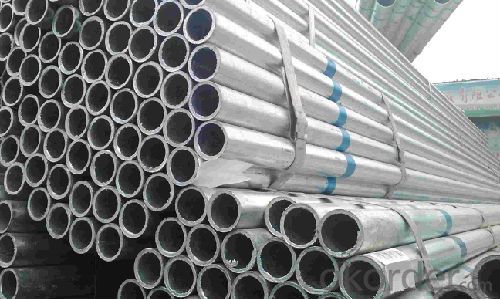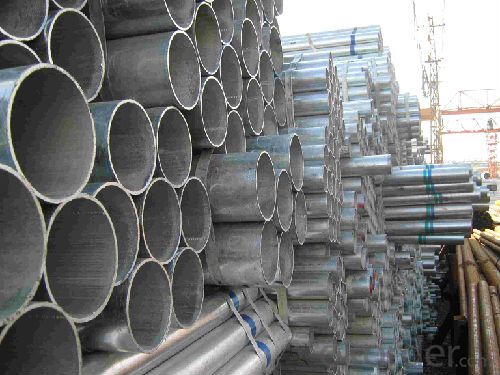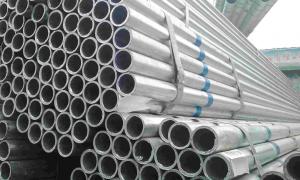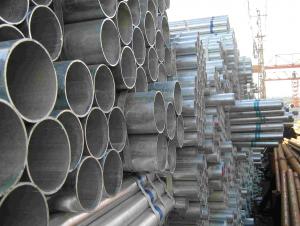Galvanized Pipe America-Standard ASTM A500 100g/200g Hot Dipped Pipe
- Loading Port:
- Tianjin
- Payment Terms:
- TT or LC
- Min Order Qty:
- 33 m.t.
- Supply Capability:
- 6000 m.t./month
OKorder Service Pledge
OKorder Financial Service
You Might Also Like
1、Structure of Galvanized Pipe America-Standard ASTM A500 100g/200g Hot Dipped Pipe:
The surface of Galvanized Pipe America-Standard ASTM A500 API 5L 100g/200g Hot Dipped Pipecan increase the corrosion resistance of the steel tube, prolong service life. Galvanized pipe is widely used, in addition to water, gas, oil and other general low pressure fluid pipelines. It is also used in the petroleum industry, especially for offshore oil field of oil well pipe and oil pipe, chemical, coking equipment of oil heater, condensation cooler, coal run oil exchanger tube, and trestle pile, the mine tunnel support frame tube.
2、Main Features of Galvanized Pipe America-StandardAPI 5L 100g/200g Hot Dipped Pipe:
• High manufacturing accuracy with standard
• High strength and stable
• Good visual effect
• Reasonable price
• Small inertia resistance
• Strong heat dissipation ability
3、Galvanized Pipe America-Standard ASTM A500 API 5L 100g/200g Hot Dipped Pipe Specification:
Standard | GB, DIN, ASTM ASTM A106-2006, ASTM A53-2007 |
Grade | 10#-45#, 16Mn 10#, 20#, 45#, 16Mn |
Thickness | 1 - 33 mm |
Section Shape | Round |
Outer Diameter | 21 - 610mm |
Place of Origin | Tianjin, China (Mainland) |
Secondary Or Not | Non-secondary |
Application | Hydraulic Pipe |
Technique | Cold Drawn |
Certification | API |
Surface Treatment | factory state or painted black |
Special Pipe | API Pipe |
Alloy Or Not | Non-alloy |
Length | 5-12M |
Outer Diameter | 21.3-610mm |
Grade | 20#, 45#, Q345, API J55, API K55, API L80, API N80, API P110, A53B |
Standard | ASME, ASTM |
1) Material:20#(ASTM A 106/A53 GRB.API5LGRB,GB),45#,16Mn,10#.
2) Specification range:OD:21.3-610mm,WT:6-70mm,length:6-12m or according to the requirement of clients.
3) Excutive standards:GB,ASME API5L.ASTM A 106/A53,Despite of the above standards,we can also supply seamless steel pipe with standard of DIN,JIS,and so on,and also develop new products according to the requirements of our clients!
4) Surface:black lacquered,varnish coating or galvanized.
5) Ends:Beveled or square cut,plastic capped,painted.
6) Packing:bundles wrapped with strong steel strip,seaworthy packing.
4、Packaging & Delivery
Packaging Details: | seaworthy package,bundles wrapped with strong steel strip |
Delivery Detail: | 15-30days after received 30%TT |
5、FAQ of Galvanized Pipe America-Standard ASTM A500 API 5L 100g/200g Hot Dipped Pipe:
①How is the quality of your products?
Our products are manufactured strictly according to national and internaional standard, and we take a test
on every pipe before delivered out. If you want see our quality certifications and all kinds of testing report, please just ask us for it.
Guaranteed: If products’ quality don’t accord to discription as we give or the promise before you place order, we promise 100% refund.
②How about price?
Yes, we are factory and be able to give you lowest price below market one, and we have a policy that “ for saving time and absolutely honest business attitude, we quote as lowest as possible for any customer, and discount can be given according to quantity
6、 Galvanized Pipe America-Standard ASTM A500 API 5L 100g/200g Hot Dipped Pipe: Images:


- Q:What are the applications of steel pipes?
- Steel pipes have a wide range of applications in various industries due to their durability, strength, and versatility. Some of the common applications of steel pipes include: 1. Plumbing and water distribution: Steel pipes are commonly used in plumbing systems to transport water and other fluids. They are resistant to corrosion and can withstand high pressure, making them ideal for water distribution networks in residential, commercial, and industrial buildings. 2. Oil and gas industry: Steel pipes are extensively used in the oil and gas industry for the transportation of oil, natural gas, and other petroleum products. They are able to handle high-pressure and high-temperature environments, making them crucial in drilling, production, and refining processes. 3. Construction and infrastructure: Steel pipes are widely employed in construction projects for various purposes such as structural support, foundations, scaffolding, and underground piping systems. They provide a strong and reliable framework for buildings, bridges, tunnels, and highways. 4. Industrial applications: Steel pipes are used in various industrial applications such as manufacturing, power plants, chemical processing, and food processing. They are often used to transport liquids, gases, or slurries within the production processes or to transfer heat in heat exchangers and condensers. 5. Agricultural sector: Steel pipes are commonly used in the agricultural sector for irrigation systems, particularly in large-scale farming. They are used to transport water from a water source to the fields, ensuring efficient and controlled water distribution. 6. Mining industry: Steel pipes are utilized in the mining industry for the extraction and transportation of minerals, ores, and other mining materials. They are resistant to abrasion and corrosion, making them suitable for the harsh and demanding conditions of mining operations. 7. Mechanical and automotive applications: Steel pipes find application in the manufacturing of various mechanical components, such as automotive exhaust systems, hydraulic cylinders, and precision tubing. They offer high strength, dimensional stability, and resistance to impact and vibration. 8. Infrastructure and utilities: Steel pipes are commonly used in infrastructure projects for the transportation of sewage, stormwater, and wastewater. They are durable, resistant to chemical corrosion, and can withstand underground conditions, making them suitable for sewer and drainage systems. In summary, the applications of steel pipes are vast and diverse, ranging from plumbing and water distribution to oil and gas industry, construction, agriculture, mining, mechanical and automotive sectors, and infrastructure projects. Their robustness, versatility, and ability to withstand extreme conditions make them a fundamental component in numerous industries.
- Q:Are steel pipes suitable for chemical processing plants?
- Yes, steel pipes are suitable for chemical processing plants. Steel pipes have excellent strength and durability, making them resistant to corrosion and able to withstand high pressure and temperature conditions common in chemical processing plants. Additionally, steel pipes can be easily welded, offering flexibility in design and installation.
- Q:What are steel pipes made of?
- Steel pipes are primarily made of steel, which is an alloy composed of iron and carbon.
- Q:What does "SC50" steel pipe mean in civil engineering?
- In the production of T-shape welded steel pipe, the wrong edges happen frequently, and the influence factors are many. In production practice, steel pipe degradation is often caused by dry, wrong and side errors. Therefore, it is necessary to analyze the causes and preventive measures of spiral steel tubes.
- Q:What are the applications of galvanized steel pipes?
- Galvanized steel pipes have a wide range of applications across various industries. They are commonly used in plumbing systems for water supply and drainage systems due to their corrosion resistance and durability. Additionally, they are used in the construction industry for structural supports, scaffolding, and fencing. Galvanized steel pipes are also widely utilized in agricultural irrigation systems and in the transportation of liquids and gases.
- Q:How are steel pipes used in the manufacturing of fire sprinkler systems?
- Steel pipes are commonly used in the manufacturing of fire sprinkler systems due to their durability, strength, and resistance to high temperatures. These pipes are used to transport pressurized water or fire retardant throughout the sprinkler system, ensuring quick and effective fire suppression. The steel pipes are installed strategically throughout the building, delivering water to sprinkler heads that are activated when heat is detected. Overall, steel pipes play a crucial role in the safe and efficient operation of fire sprinkler systems, protecting lives and property from the devastating effects of fires.
- Q:How big is the seamless steel tube of DN50?
- DN refers to the nominal diameter, the outer diameter is 60.3mm
- Q:What are the different factors affecting the flow rate of steel pipes?
- There are several factors that can affect the flow rate of steel pipes, including the diameter and length of the pipe, the viscosity and temperature of the fluid being transported, the pressure difference across the pipe, and any obstructions or irregularities in the pipe's interior surface. Additionally, the type of fluid being transported and its flow characteristics, such as laminar or turbulent flow, can also impact the flow rate of steel pipes.
- Q:What are the lengths of scaffold steel tubes?
- Used to build scaffolding of steel pipes in general have two kinds, an outer diameter 48mm, wall thickness 3.5mm; another kind of outer diameter 51mm, wall thickness 3mm; according to its location and role of different, can be divided into vertical pole, horizontal rod, sweeping rod, etc.. According to the technical specification for construction of steel tubular scaffold with couplers, JGJ 130 - 2011[1]. The scaffolding steel pipe should be specified with the current national standard "GB/T13793" or "straight seam welded steel pipe welded steel pipe for low pressure liquid delivery" GB/T3091 Q235 ordinary steel pipe; steel pipe steel quality should meet the requirements of current national standard grade Q235 steel "carbon structural steel" in GB/T700. The scaffold pipe shall be made of a diameter of 48.3 * 3.6 steel tubes. The maximum mass of each steel tube shall not be greater than 25.8kg.
- Q:How are steel pipes protected from corrosion in corrosive environments?
- Steel pipes are protected from corrosion in corrosive environments through various methods such as applying protective coatings, using cathodic protection, and employing corrosion inhibitors.
1. Manufacturer Overview |
|
|---|---|
| Location | |
| Year Established | |
| Annual Output Value | |
| Main Markets | |
| Company Certifications | |
2. Manufacturer Certificates |
|
|---|---|
| a) Certification Name | |
| Range | |
| Reference | |
| Validity Period | |
3. Manufacturer Capability |
|
|---|---|
| a)Trade Capacity | |
| Nearest Port | |
| Export Percentage | |
| No.of Employees in Trade Department | |
| Language Spoken: | |
| b)Factory Information | |
| Factory Size: | |
| No. of Production Lines | |
| Contract Manufacturing | |
| Product Price Range | |
Send your message to us
Galvanized Pipe America-Standard ASTM A500 100g/200g Hot Dipped Pipe
- Loading Port:
- Tianjin
- Payment Terms:
- TT or LC
- Min Order Qty:
- 33 m.t.
- Supply Capability:
- 6000 m.t./month
OKorder Service Pledge
OKorder Financial Service
Similar products
New products
Hot products
Related keywords































